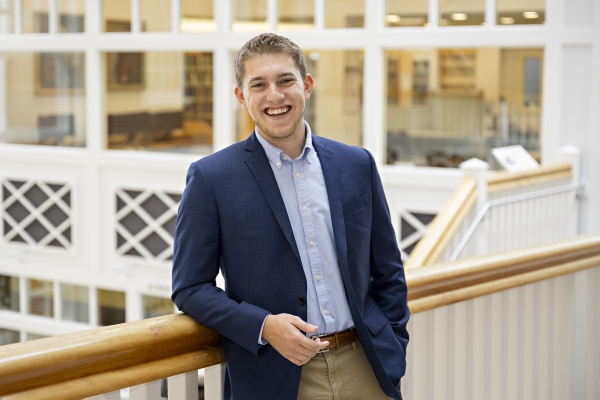Meet Ian Davis ‘23 Davis’s summer internship reinforced his career aspirations as a neuroscience major.
We love it when classes are in session here on campus, but the learning doesn’t stop when summer starts! Summers offer unique opportunities for Washington and Lee University students to explore their interests and gain valuable professional experience, and W&L’s abundant resources make it easy to find internships and research opportunities across the country and around the world.
As part of the Faces of W&L series, we caught up with W&L students about their unique summer experiences. Learn more about student summer opportunities here.
Name: Ian Davis
Hometown: Londonderry, New Hampshire
Major: Neuroscience
As a summer fellow with the Dana’s Angels Research Trust (DART) program, I worked as a research assistant at the National Institutes of Health. At the NIH, I worked with a team of staff scientists, post-doctorates and post-baccalaureate fellows studying potential therapies for Niemann-Pick disease type C1 (NPC1).
The first four weeks of my internship focused primarily on understanding the biological background of the disease and the specific protocols of the lab. These protocols ranged from growing stem cells and applying drug treatments to more analytical tests like protein assay and DNA amplification. Once I gained familiarity with the lab, I was given an independent project involving specific drug treatments and their effects on NPC1-affected neurons. I had the responsibility of differentiating stem cells into neurons, applying a given pharmaceutical treatment, and analyzing changes in different biomarkers relevant to our disease model.
After spending eight weeks surrounded by some of the best scientific minds in the country, I could not be more grateful for the DART program. My summer mentors constantly challenged me to understand the “why” behind each aspect of the work. They also provided me with the necessary tools to be an independent contributor to a cause and to a team that I hold a tremendous amount of respect for.
Knowing that our work translates directly to the clinical side of patient care has only reinforced my career aspirations and sense of purpose as I pursue a neuroscience education. The research we conduct has the potential to save and improve lives, and fully comprehending that can only come from an experience like this. Above all, I’ve gained a clearer perspective on the tools I need to pursue a career in research, and I am excited to keep moving forward.
 Ian Davis ‘23
Ian Davis ‘23
You must be logged in to post a comment.